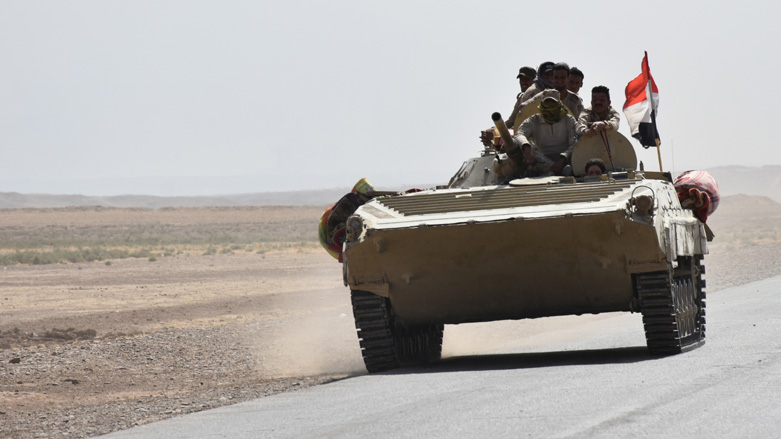KRG calls on UN, US, Coalition, EU, Sistani to prevent war between Peshmerga, Iraqi forces

ERBIL, Kurdistan Region (Kurdistan 24) – Prime Minister of the Kurdistan Region Nechirvan Barzani released a statement denouncing the deployment of Iraqi Forces and Iranian-backed Shiite militias to areas around Kirkuk and Mosul.
He suggested the mobilization of Iraqi army units and the Shiite Hashd al-Shaabi militia, also known as the Popular Mobilization Forces (PMF), was due to the October 10th press conference where Iraqi Prime Minister Haider al-Abadi threatened to use military action against the Kurdistan Region.
“We as the Kurdistan Regional Government (KRG) ask Ayatollah Seyid Ali al-Sistani, Iraqis, the UN, the US, the EU, and members of the Global Coalition against the Islamic State (IS), the UN Security Council, and the neighboring countries to play their vital role and quickly intervene to prevent a new war [between Iraqi forces and Peshmerga],” the statement read.
“We ask the Iraqi Forces and all foreign forces to avoid conflict as it would have an extremely negative impact on the internal and regional situation and lay fertile ground for IS and other terrorist organizations to empower themselves.”
Since Thursday night, PMF and other Iraqi troops have gathered in southern Kirkuk. The Kurdistan Region’s security and intelligence labeled it "a dangerous indication" they planned to attack Kurdistan.
Barzani emphasized that the KRG is ready to have a constructive dialogue with Baghdad, and held Haider al-Abadi, the Prime Minister and General Commander of all Iraqi Forces, responsible for any attack on the Region.
The Kurdish Premier called on all groups in the Kurdistan Region to be prepared and to support the Peshmerga in responding to any assault, and “to protect all the cities of the Kurdistan Region and prevent them from becoming like Mosul, Anbar and other areas in Iraq which suffered mass executions and destruction.”
He also asked political parties in the Kurdistan Region unite in preserving the peace and defending the region.
“The cities of the Kurdistan Region have been a haven for hundreds of thousands of IDPs who fled from the war on IS and sectarian conflict in Iraq. It is very odd that the government of Iraq wishes to destroy security in the Kurdistan Region and resort to the use of the military.”
The Kurdish official noted that following the emergence of the jihadist group in northern Iraq, the Iraqi army fled from Kirkuk and surrounding territories. Since then, the people in those areas have been living in peace, and under the protection of the Peshmerga and Kurdish security forces, he added.
Barzani declared that no "solution" should be imposed on the disputed regions without the approval of the people in those areas and that a special administration reflecting the desire and will of people in the contested lands should be created, which the KRG is willing to support.
Prime Minister Barzani reiterated that the KRG is ready for dialogue and against the use of violence to resolve its disputes with Baghdad.
“Our call for dialogue and understanding should not be met with the deployment of troops and the implementation of practical steps preparing for war,” Barzani concluded.
The relationship between Erbil and Baghdad has been tense for the past few years, but quickly deteriorated following the Sep. 25 vote as Baghdad ramps up its collective punitive measures against the people of the Kurdistan Region.
Editing by G.H. Renaud
